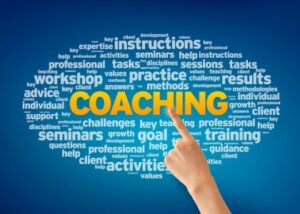In the fast-paced and dynamic business landscape, the demand for effective leadership has never been greater. As organizations strive for success, executives are increasingly turning to specialized professionals known as Executive Performance coaches to enhance leadership skills, optimize performance, and navigate the complexities of the corporate world.
In this blog post, we will explore the key role of an Executive Performance Coach, shedding light on how they contribute to the growth and success of leaders and organizations. We’ll delve into the significance of executive coaching, the skills that make a coach invaluable, and the transformative impact they can have on an executive’s professional journey.
Contents
What is an Executive Performance Coach?

An Executive Performance Coach is a specialized professional who works closely with executives, high-level leaders, and professionals to enhance their leadership skills, optimize performance, and foster personal and professional growth. These coaches operate within the realm of executive coaching, employing a tailored and results-oriented approach to help individuals in leadership positions achieve their full potential.
The primary focus of an Executive Performance Coach is to collaborate with executives, understand their unique challenges, provide constructive feedback, and guide them in developing strategies to overcome obstacles and capitalize on opportunities. By fostering self-awareness, refining leadership styles, and addressing specific goals, Executive Performance Coaches contribute significantly to leaders’ success and organizations’ overall effectiveness in today’s competitive business landscape.
Role of an Executive Performance Coach
The role of an Executive Performance Coach is multifaceted and plays a critical part in the success and development of organizational leaders. These coaches are dedicated professionals who work closely with executives to maximize their potential, enhance their leadership skills, and drive overall performance improvement. Here’s an in-depth exploration of the key roles an Executive Performance Coach undertakes:
- Performance Optimization:
- Assessment and Analysis: Executive coaches start by conducting thorough assessments of an executive’s strengths, weaknesses, and overall performance. This involves gathering feedback from various sources, including peers, subordinates, and self-assessment tools.
- Goal Setting: Coaches collaborate with executives to establish clear and measurable performance goals. These goals are aligned with both personal and organizational objectives, serving as benchmarks for success.
- Strategy Development: Once goals are identified, coaches work with executives to develop strategies and action plans. This involves exploring innovative approaches, leveraging strengths, and addressing areas that require improvement.
- Leadership Development:
- Identification of Leadership Styles: Executive coaches help leaders identify and understand their leadership styles. Through self-awareness and exploration, executives can refine their approaches, ensuring alignment with organizational goals and values.
- Communication and Influence: Effective leadership involves strong communication and the ability to influence others positively. Coaches work on refining communication skills, fostering an environment of trust, and enhancing the executive’s ability to inspire and motivate their team.
- Feedback and Continuous Improvement:
- Constructive Feedback: One of the primary roles of an executive coach is to provide constructive feedback. This feedback is based on keen observations, assessments, and discussions, highlighting areas for improvement and recognizing achievements.
- Course Correction: Executives may face challenges or obstacles in their leadership journey. Coaches assist in navigating these challenges, offering guidance for course correction and adjustments to the executive’s approach.
- Personal and Professional Growth:
- Identification of Development Opportunities: Coaches work with executives to identify opportunities for personal and professional growth. This may involve exploring new skills, expanding perspectives, and embracing challenges as avenues for development.
- Overcoming Limiting Beliefs: Executives may hold limiting beliefs that hinder their progress. Coaches help identify and overcome these obstacles, fostering a mindset conducive to continuous learning and improvement.
- Accountability and Support:
- Accountability Structures: Coaches establish accountability structures to ensure executives remain committed to their goals and action plans. Regular check-ins and assessments help track progress and adjust strategies as needed.
- Emotional Support: The executive coaching relationship goes beyond professional development. Coaches provide emotional support, serving as a trusted confidant for executives to discuss challenges, concerns, and personal growth aspirations.
- Organizational Impact:
- Alignment with Organizational Goals: An executive coach ensures that the individual goals of an executive align with the broader objectives of the organization. This alignment is essential for driving organizational success and a cohesive leadership strategy.
- Cultural Integration: Coaches assist executives in integrating leadership practices that align with the organizational culture. This ensures a harmonious and collaborative work environment.
Positive Influence of an Executive Performance Coach on the Audience

An executive performance coach can have a range of positive influences on their audience, which typically consists of executives, leaders, or individuals in positions of influence within organizations. Here are several positive impacts that an executive performance coach can have on their audience:
- Enhanced Leadership Skills: Coaches help executives identify and develop effective leadership skills, empowering them to lead with confidence and influence their teams positively.
- Improved Decision-Making: By working with executives on critical thinking and problem-solving skills, coaches contribute to better decision-making processes, enabling leaders to make informed and strategic choices.
- Increased Self-Awareness: Coaches facilitate self-reflection, helping executives gain a deeper understanding of their strengths, weaknesses, values, and leadership styles. This heightened self-awareness contributes to more authentic and impactful leadership.
- Effective Communication: Coaches assist in refining communication skills, ensuring that executives can articulate their ideas clearly, listen actively, and navigate complex interpersonal dynamics with finesse.
- Stress Management: Executives often face high levels of stress and pressure. Coaches provide tools and strategies to manage stress effectively, promoting resilience and maintaining optimal performance under challenging circumstances.
- Goal Achievement: Through collaborative goal-setting and action planning, coaches help executives set and achieve meaningful goals, both personally and professionally, fostering a sense of accomplishment and progress.
- Increased Productivity and Efficiency: Coaches work with executives to optimize time management, prioritize tasks, and streamline processes, leading to increased productivity and efficiency in their roles.
- Enhanced Team Dynamics: Coaches address team-related challenges, helping executives build and lead high-performing teams. This includes promoting collaboration, resolving conflicts, and fostering a positive team culture.
Finding an Executive Performance Coach Near Me

Finding an executive performance coach in India can be facilitated through various online platforms that connect coaches with individuals seeking their services. Here are some websites and platforms where you can search for executive coaches in India:
- LinkedIn: LinkedIn is a professional networking platform where many executive coaches create profiles to showcase their expertise. You can use the search bar to find executive coaches in India and explore their profiles.
- MantraCoach: MantraCoach is a global coaching platform that connects coaches with clients. They have a directory of certified coaches, including executive coaches. You can search for coaches based in India on their website.
- ICF (International Coach Federation): The ICF is a global organization for professional coaches. You can use the ICF’s website to find certified coaches, including those specializing in executive coaching, by searching for coaches in India.
- Noomii: Noomii is an online directory of life coaches, business coaches, and executive coaches. You can search for coaches in India and view their profiles to find the right match for your needs.
- Quora: Quora is a question-and-answer platform where professionals, including coaches, often participate in discussions. You can ask for recommendations or search for executive coaches in India on Quora.
- UrbanPro: UrbanPro is a local services marketplace in India that includes a section for coaching services. You can search for executive coaches in your city and explore profiles, reviews, and contact information.
- Therapize India: Therapize India is a platform that connects individuals with therapists and coaches. You can explore their directory to find executive coaches based in India.
- Consult HR or Leadership Development Departments: If you’re part of an organization, check with your Human Resources or Leadership Development department. They might have recommendations or resources for executive coaching.
- Local Business Directories: Look in local business directories, both online and offline. Some coaches may have their services listed in these directories.
- Consultation Calls: Once you identify potential coaches, schedule consultation calls to discuss your needs and goals. This allows you to assess their approach and determine if there’s a good fit.
Remember to consider the coach’s credentials, experience, and coaching style when making your decision. Additionally, ensure that the coach aligns with your specific needs and objectives for executive performance coaching.
Conclusion
In the pursuit of finding an Executive Performance Coach near you, a combination of online and offline strategies proves valuable. Leveraging search engines, professional directories, and platforms dedicated to coaching services can yield promising results. Seeking guidance from HR departments, business associations, and industry-specific organizations can provide insights into reputable coaches. Personal recommendations and online reviews add a layer of assurance.
Ultimately, the key lies in thorough research, consultation calls, and consideration of factors like credentials, experience, and coaching style to ensure a harmonious and effective partnership with the chosen Executive Performance Coach.
If you are looking for executive coaching MantraCoach is here to help. Book your free trial executive coaching for employees session now.


